by Naomi L. | November 16, 2016 | Blog, Creative Writing |
Still working on that NaNoWriMo novel? Whether you’re trying to churn out a 50,000-word novel or just sticking to short stories for now, impeccable writing skills are key to success in the long run, and that includes proper grammar and spelling of everything from simple words to long phrases and idioms. There are plenty of everyday expressions that we’re used to hearing but not reading or writing, and this often leads to misspellings. It never hurts to keep notes of these misheard idioms for future reference, which is why I compiled another list of words and phrases from the Elevate – Brain Training app, this time from the Expression game.
So continuing on a trend of writing lessons from Elevate, here are 14 common expressions that you may be writing incorrectly. Enjoy!
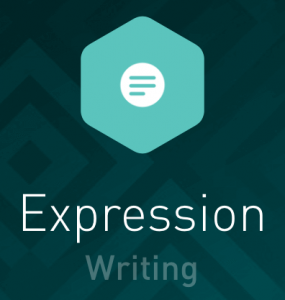 1) All of a sudden: an alternative expression for “suddenly”. Write “all of a sudden”, not “all of the sudden”.
1) All of a sudden: an alternative expression for “suddenly”. Write “all of a sudden”, not “all of the sudden”.
2) Compliments of the house: indicates that something is being given for free. Write “compliments of the house”, not “complements of the house”.
3) Couldn’t care less: expresses a complete lack of interest. Write “couldn’t care less”, not “could care less”.
4) Deep-seated: describes something firmly established at a profound level. Write “deep-seated”, not “deep-seeded”.
5) Due diligence: the reasonable steps taken to satisfy a legal requirement. Write “due diligence”, not “do diligence”.
6) En route: a French expression meaning “during the course of” or “on the way”. Write “en route”, not “on route”.
7) For all intents and purposes: indicates that a concept applies in all important respects. Write “for all intents and purposes”, not “for all intensive purposes”.
8) Free rein: indicates freedom of action or expression. Write “free rein”, not “free reign”.
9) Harebrained: describes an idea that is rash or ill-advised. Write “harebrained”, not “hairbrained”. (Thanks to Robert Kirkendall for this one!)
10) Lo and behold: presents a surprising situation with the suggestion that it could have been predicted. Write “lo and behold”, not “low and behold”.
11) No love lost: indicates a mutual dislike between parties. Write “no love lost”, not “no love loss”.
12) Rife with: denotes that someone or something is full of a given emotion or idea. Write “rife with”, not “ripe with”.
13) Sleight of hand: dexterity typically used in performing tricks. Write “sleight of hand”, not “slight of hand” nor “slide of hand”. (Thanks to M.C. Tuggle for this one!)
14) Through the wringer: indicates subjecting someone to a stressful experience. Write “through the wringer”, not “through the ringer”.
Have you ever gotten any of these expressions wrong? What other expressions would you add to this list?
by Naomi L. | November 9, 2016 | Blog, Creative Writing, Featured |
Rhetoric: the beautiful art of persuasive speaking and writing that all ambitious people strive to master. It’s a powerful tool for success; within a social and communicative species like ours, so many goals can be achieved simply through the use of effective speech and composition. English is rife with handy rhetorical devices, and while you work on that NaNoWriMo novel, you should consider how to use language to its greatest potential, as much among your characters as with your audience.
So for your reference, here is a list of six popular rhetorical devices, complete with explanations and examples for how to use them. Enjoy!
1) Analogies are as easy as pie.
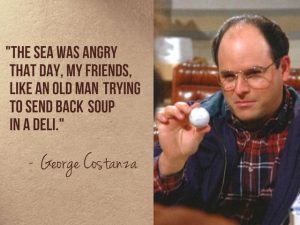
The sea was angry that day, my friends, like an old man trying to send back soup in a deli. – George Costanza, Seinfeld (Season 5, Episode 14 – The Marine Biologist)
(Image source: Playbuzz)
The analogy is one of the first rhetorical devices we learn to use in school. The basic formula is simple: take two similar ideas and connect them with “as” or “like” (which gives you a simile). They can also be more complex, making use of similes and metaphors to strengthen a comparison in the minds of readers and listeners, thus leaving a lasting impression on the audience.
Analogies are particularly useful for making complex ideas accessible by comparing unfamiliar concepts with familiar ones. Aside from providing simple explanations, they can also be used to create vivid images that engage the audience, such as “autumn leaves falling like golden rain” or “a young lady as beautiful and delicate as a rose”. Try not to use too many analogies at once, though; constantly comparing one image to another will not only get tiresome quickly, but could give the impression of unoriginality, especially if you’re comparing your work to someone else’s. Don’t make your stories as average as the next person’s!
2) Hyperbole is the greatest rhetorical device ever created!
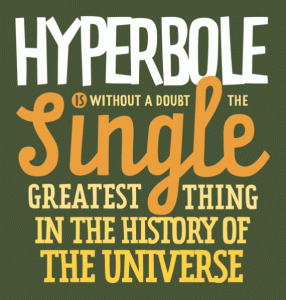 There’s nothing like exaggeration to get a point across. Who among us hasn’t shared our experiences of “the greatest thing ever”, “the worst day in history”, or “the most fun I’ve ever had in my entire life”? Hyperbole is a common device for creating emphasis, as exaggeration tends to have a great impact on an audience’s perceptions of a given description.
There’s nothing like exaggeration to get a point across. Who among us hasn’t shared our experiences of “the greatest thing ever”, “the worst day in history”, or “the most fun I’ve ever had in my entire life”? Hyperbole is a common device for creating emphasis, as exaggeration tends to have a great impact on an audience’s perceptions of a given description.
If you think about it, it’s funny how we’re inclined to exaggerate so often. After all, nobody literally “dies of embarrassment”, bags don’t literally “weigh a ton”, and friends don’t literally “go forever without seeing each other”. Yet we excuse this lack of literal sense in favor of the bolder imagery that fascinates us so, as if reaching to the limits of our imagination and beyond is simply second nature.
While it shouldn’t be used in excess, hyperbole is a good addition to any conversation that calls for dramatic emphasis. Have your characters use this device to add an informal or amusing tone to your dialogue, while in narrative you can use it to demonstrate intensity or create contrasts with normal descriptions. Use it wisely, and the hyperbole may just help you write the best stories ever!
3) Metaphors are a piece of cake.
All the world’s a stage,
And all the men and women merely players.
– William Shakespeare, As You Like It
Ah, metaphors: the celebrated heroes of poetic language. This is an especially popular device in rhetoric, using figurative speech to make strong comparisons where literal expressions would fall short. A close cousin of the simile and building block of the full analogy, the metaphor is an effective tool for constructing imagery that appeals to the audience’s imagination and draws them further into a story. Why say a soldier is “brave” when you can call him a “lion”, or say that a sound is “sweet” when you can call it “music to one’s ears”?
Metaphors have become so pervasive in modern language that we don’t even realize how heavily we rely on them in everyday speech. We suffer “broken hearts”, laugh “our heads off”, cry “rivers of tears”, and “bottle up” our anger. We’re “early birds” and “night owls”, “open books” and “loose cannons”, “black sheep” and “couch potatoes”, all lost in a “sea of faces” in the great “melting pot” that is our world. Is it even possible to speak completely literally anymore? I can only imagine how hard (and fun) it must have been to write Drax’s lines for Guardians of the Galaxy!
The metaphor is useful for creating impact in a story, so long as it’s used sparingly and with good timing. If you find your writing is lacking some flair, a well-placed metaphor, whether short and sweet or long and complex, may be just the thing to “brighten up” your story and “paint a colorful picture” in your readers’ minds!
4) Oxymorons are stupidly brilliant!
And faith unfaithful kept him falsely true.
– Idylls of the King (Alfred Tennyson, 1859–1885)
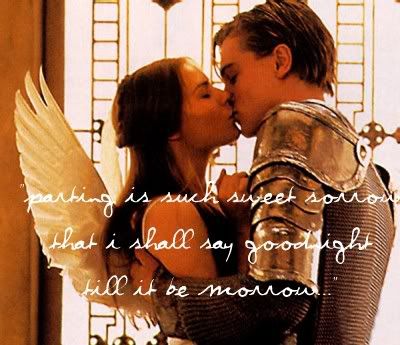
Good night, good night! Parting is such sweet sorrow / That I shall say good night till it be morrow. – Juliet Capulet (Romeo & Juliet, 2.2.185–86)
(Screencap source: Romeo + Juliet, 1996)
This is one of my favorite rhetorical devices, for even though I don’t use it often myself, I enjoy the comical irony of using opposites to create a coherent phrase. The oxymoron is a figure of speech formed by combining contradictory terms, which often leads to humorous results: “jumbo shrimp”, “found missing”, “act naturally”, and so on. Some are even taken for granted as commonplace expressions, such as “virtual reality” and “science fiction”. And what horror fan could forget the classic “living dead”?
The beauty of the oxymoron is that it can just as easily slip by unnoticed as it can make us pause to think when pointed out. In rhetoric, this device can be used to create a paradox and draw attention to a contradiction, such as in Romeo’s criticism of the contrasts of love in Shakespeare’s Romeo & Juliet:
O heavy lightness, serious vanity,
Misshapen chaos of well-seeming forms!
Feather of lead, bright smoke, cold fire, sick health,
Still-waking sleep, that is not what it is!
– Romeo Montague (Romeo & Juliet, 1.1.184–87)
Overall, oxymorons are good for creating dramatic effect in poetry and in prose. They’re also popular as satirical devices, and can make great additions to a piece of humorous writing. So the next time you feel stuck writing comedy, why not try making opposites attract? You may be able to create some “seriously funny” works!
5) I’m not saying paralipsis is an evasive maneuver, but…
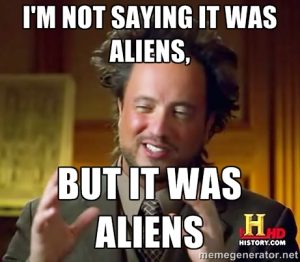 This one was recently featured as a Word of the Week on my blog. It’s common to hear people use such phrases as “I’m not saying”, “not to mention”, and “needless to say”, only to immediately follow them up with a piece of information they just said they wouldn’t talk about. This is known as paralipsis, an ironic way to draw attention to a subject by explicitly stating you won’t mention it.
This one was recently featured as a Word of the Week on my blog. It’s common to hear people use such phrases as “I’m not saying”, “not to mention”, and “needless to say”, only to immediately follow them up with a piece of information they just said they wouldn’t talk about. This is known as paralipsis, an ironic way to draw attention to a subject by explicitly stating you won’t mention it.
A relatively colloquial device, paralipsis is used most effectively in speech rather than in writing, making it a good choice for character dialogue. One of the most notable examples in literature (as pointed out by Mike of M.C. Tuggle, Writer) is Mark Antony’s speech in Shakespeare’s Julius Caesar, in which Antony brilliantly uses this device to turn the crowd against Brutus and the other conspirators:
Have patience, gentle friends, I must not read it;
It is not meet you know how Caesar loved you.
You are not wood, you are not stones, but men;
And, being men, bearing the will of Caesar,
It will inflame you, it will make you mad.
‘Tis good you know not that you are his heirs;
For if you should, O, what would come of it!
– Mark Antony (Julius Caesar, 3.2.139–45)
In rhetoric, paralipsis has several uses: to indirectly point something out, to make a passive-aggressive comment, to criticize someone without being held accountable, or to explain something while politely avoiding a suggestion of ignorance (or, alternatively, to make a sarcastic comment about the audience’s ignorance). Though it should be used carefully, this is a highly effective device that can make for some exceptionally persuasive speech. I’m not saying it’ll help you reach or even surpass the level of your favorite authors, but learning to use paralipsis well will definitely improve your proficiency as a writer!
6) I love when people take sarcasm seriously.
Irony in its sharpest form, sarcasm is hailed as one of the most beloved tools in the comedic arsenal – so much so, that it’s become nearly impossible not to hear it in some form or other in everyday speech. Sarcasm is basically the use of wit to make a point, typically in a bitter way that conveys contempt. This device comes in many flavors, including deadpan, self-deprecating, manic, and even polite. It’s used to amusingly draw attention to the obvious, to mock oneself or others, or simply as a coping mechanism to make the frustrations of life a little more bearable. I know I’ve had those days that I couldn’t survive without a little sarcasm to tide me over!

Leonard has to clue Sheldon in on Penny’s sarcasm (The Big Bang Theory: Season 1, Episode 2 – The Big Bran Hypothesis)
(Image source: Tumblr)
Given its acidic nature, sarcasm is best exercised with caution. Like most humor techniques, it’s hard to teach because each person uses it differently and even harder to master because not everyone understands it, but sarcasm in particular is worth the effort as it’s a strong indicator of the writer and the readers’ intelligence. Use it in dialogue to demonstrate a character’s sharp wit or occasionally in narrative to indirectly criticize people and society, and if you must use it to address your readers, at least try not to be too offensive and alienate an audience who have no sense of humor. Or, you know, just do whatever you want. Why give a damn what the rest of the world thinks?
What are your thoughts on these rhetorical devices? Any other favorites you would add to this list?
by Naomi L. | November 2, 2016 | Blog, Creative Writing |
Welcome to November! National Novel Writing Month is upon us again, a whole 30 days for writers to put their excuses aside, scrape together all those loose ideas, and finally write that 50,000-word novel! It’s certainly an intimidating task to say the least, but a little motivation can go a long way in helping you get started. Last year, I shared some helpful writing tips in the form of 10 inspirational quotes from famous authors, so this year I’m sharing some more quotes, this time about the creative process and what it means to be a writer.
So on that note, here are 10 more inspirational writing quotes for novel-writing motivation. Enjoy, and good luck in this year’s NaNoWriMo!
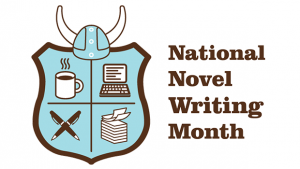
National Novel Writing Month
1) The scariest moment is always just before you start. – Stephen King, On Writing: A Memoir of the Craft
2) And by the way, everything in life is writable about if you have the outgoing guts to do it, and the imagination to improvise. The worst enemy to creativity is self-doubt. – Sylvia Plath, The Unabridged Journals of Sylvia Plath
3) Tomorrow may be hell, but today was a good writing day, and on the good writing days nothing else matters. – Neil Gaiman
4) There is no greater agony than bearing an untold story inside you. – Maya Angelou, I Know Why the Caged Bird Sings
5) You must write every single day of your life… You must lurk in libraries and climb the stacks like ladders to sniff books like perfumes and wear books like hats upon your crazy heads… may you be in love every day for the next 20,000 days. And out of that love, remake a world. – Ray Bradbury
6) Those who find ugly meanings in beautiful things are corrupt without being charming. This is a fault. Those who find beautiful meanings in beautiful things are the cultivated. For these there is hope. They are the elect to whom beautiful things mean only Beauty. There is no such thing as a moral or an immoral book. Books are well written, or badly written. That is all. – Oscar Wilde, The Picture of Dorian Gray
7) I can shake off everything as I write; my sorrows disappear, my courage is reborn. – Anne Frank
8) Lock up your libraries if you like; but there is no gate, no lock, no bolt that you can set upon the freedom of my mind. – Virginia Woolf, A Room of One’s Own
9) The first draft is just you telling yourself the story. – Terry Pratchett
10) Start writing, no matter what. The water does not flow until the faucet is turned on. – Louis L’Amour
What are your thoughts on these writing quotes? Any others you’d add to the inspirational list for NaNoWriMo?
by Naomi L. | October 26, 2016 | Blog, Creative Writing, What If? Writing Prompts |
With Halloween less than a week away, why not celebrate with some more “What If?” Writing Prompts? To help get you into the Halloween spirit, this week’s batch features new prompts in the horror genre. See what spooky tales you can spin from these ideas! Enjoy, and Happy Halloween!
 What if… your nightmares were actually prophecies?
What if… your nightmares were actually prophecies?
What if… you suspected your pet of being possessed by an evil spirit?
What if… when you looked in the mirror, you saw how you were going to die?
What if… you heard screams coming from the old abandoned house in your neighborhood?
What if… you had a feeling you were being stalked by a monster everywhere you went?
Have fun writing some more tales of horror!
If you have any “What If?” writing prompt suggestions (for any theme), please feel free to share them in the comments below. Ideas I like may be featured in future “What If?” posts, with full credit and a link to your blog (if you have one)! Also, if you’ve written a piece based on an idea you’ve found here, be sure to link back to the respective “What If?” post. I would love to see what you’ve done with the prompt! Thank you!
by Naomi L. | October 19, 2016 | Blog, Creative Writing |
Remember that list of 20 sets of homonyms I shared a year ago, or that list of 25 sets of easily confused words I shared last month? Maybe you haven’t been reading my blog for that long, but if you do recall reading them, you may appreciate the overlap of their themes in today’s creative writing post. The Error Avoidance game in the Elevate – Brain Training app includes several pairs of homophones – so many, in fact, that instead of including them in the aforementioned list of commonly confused words, I saved them to add to another list of homonyms. The English language has so many, it’s hard to keep track!
So on that note, here’s a list of 32 more pairs and sets of homonyms to watch out for in your writing. Enjoy!
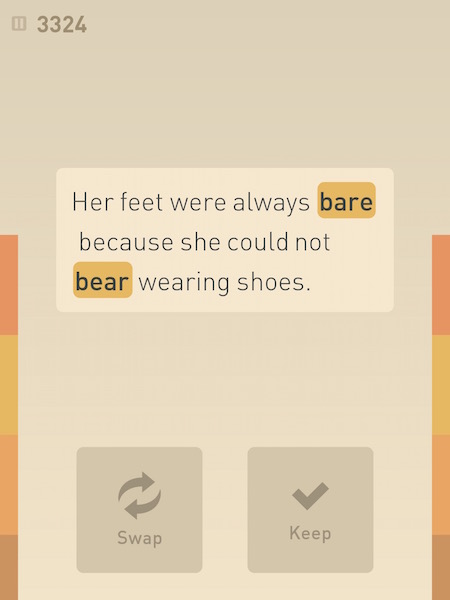 1) Bail / Bale – “Bail” is the temporary release of an accused person awaiting trial. A “bale” is a tightly wrapped bundle of a material, such as hay or cotton.
1) Bail / Bale – “Bail” is the temporary release of an accused person awaiting trial. A “bale” is a tightly wrapped bundle of a material, such as hay or cotton.
2) Bare / Bear – To be “bare” is to be uncovered. To “bear” is to carry, support, or endure.
3) Baited / Bated – To be “baited” is to be prepared with a lure or to give in to a taunt. To be “bated” is to be in great suspense.
4) Bow / Bough – To “bow” is to bend the head or upper part of the body. A “bough” is a main branch of a tree.
5) Canvas / Canvass – A “canvas” is a type of strong, coarse cloth. To “canvass” is to solicit votes from electors.
6) Cite / Sight / Site – To “cite” a passage from a book or author is to quote it as evidence for a statement. A “sight” is anything that one sees or that can be seen. A “site” is an area where a building is constructed or where an event occurs.
7) Creak / Creek – To “creak” is to make a high-pitched sound when being moved. A “creek” is a stream or brook.
8) Doe / Dough – A “doe” is a female deer. “Dough” is a mix of flour and liquid used for baking.
9) Fair / Fare – To be “fair” is to be in accordance with the rules, while a “fair” is a gathering of amusements for public entertainment. A “fare” is the money a passenger has to pay for public transportation, while to “fare” is to perform in a specified way.
10) Faze / Phase – To “faze” someone is to disturb or disconcert them. A “phase” is a distinct period or stage in a process.
11) Flair / Flare – “Flair” is a special ability for doing something well. A “flare” is a burst of bright light or flame.
12) Floe / Flow – A “floe” is a sheet of floating ice. To “flow” is to steadily move along in a continuous stream.
13) Foreword / Forward – A “foreword” is a short introduction to a book. “Forward” is toward the front or future.
14) Gored / Gourd – “Gored” is the past tense of “gore”, which means to pierce or stab. A “gourd” is a large fleshy fruit or a drinking container.
15) Hail / Hale – “Hail” is frozen rain. To be “hale” is to be strong and healthy.
16) Hangar / Hanger – A “hangar” is a building for housing an aircraft. A “hanger” is an item that holds clothes.
17) Hawk / Hock – A “hawk” is a bird of prey, while to “hawk” is to peddle goods. To “hock” is to pawn one’s possessions, while a “hock” is a cut of meat.
18) Hew / Hue – To “hew” is to chop or cut. A “hue” is a color or shade.
19) Hoard / Horde – To “hoard” is to amass money or valuable items and store them away. A “horde” is a large group of people.
20) Lightening / Lightning – “Lightening” is the act of making something lighter. “Lightning” is an electrical weather phenomenon.
21) Loath / Loathe – To be “loath” is to be reluctant or unwilling. To “loathe” is to hate or despise.
22) Pail / Pale – A “pail” is a bucket. To be “pale” is to be light in color or to seem less important.
23) Pair / Pare – A “pair” is a set of two. To “pare” is to trim away the outer edges of something.
24) Palate / Palette / Pallet – A “palate” is a person’s appreciation of taste and flavor. A “palette” is a range of colors used by an artist. A “pallet” is a portable platform used for moving, stacking, and storing goods.
25) Peal / Peel – To “peal” is to ring loudly. To “peel” is to remove an outer layer.
26) Premier / Premiere – To be “premier” is to be first in importance. A “premiere” is the first performance or showing of a theatrical work or movie.
27) Raise / Raze – To “raise” is to lift up. To “raze” is to destroy completely.
28) Reek / Wreak – To “reek” is to smell strongly and unpleasantly. To “wreak” is to inflict or cause a large amount of damage.
29) Sear / Seer / Sere – To “sear” is to burn or scorch the surface of something. A “seer” is a person who supposedly is able to see what the future holds. To be “sere” is to be dry or withered.
30) Succor / Sucker – “Succor” is a form of assistance and support. A “sucker” is a lollipop or a gullible person.
31) Vice / Vise – A “vice” is a moral flaw. A “vise” is a device that holds an object in place.
32) Warrantee / Warranty – A “warrantee” is a person to whom a guarantee is given. A “warranty” is a written guarantee promising to repair or replace a purchase if necessary.
Have you ever mixed up these words before? What other pairs or sets of homonyms would you add to this list?
by Naomi L. | October 12, 2016 | Blog, Creative Writing, Featured |
Yes, I know I’ve been writing a lot about my recent graduate school achievement lately and it might be getting tiresome to my regular readers. Don’t worry; I promise it’ll only go on for like, two more months (just kidding!). In all seriousness, though, my Master’s thesis did teach me a lot about writing, as much in science as in general, and since it’s been such an insightful experience, I thought it would be fun to share what I learned on my creative writing blog.
So on that note, here are five lessons I learned from writing my Master’s thesis. Enjoy!
1) A thesis will never, ever be perfect. Ever.
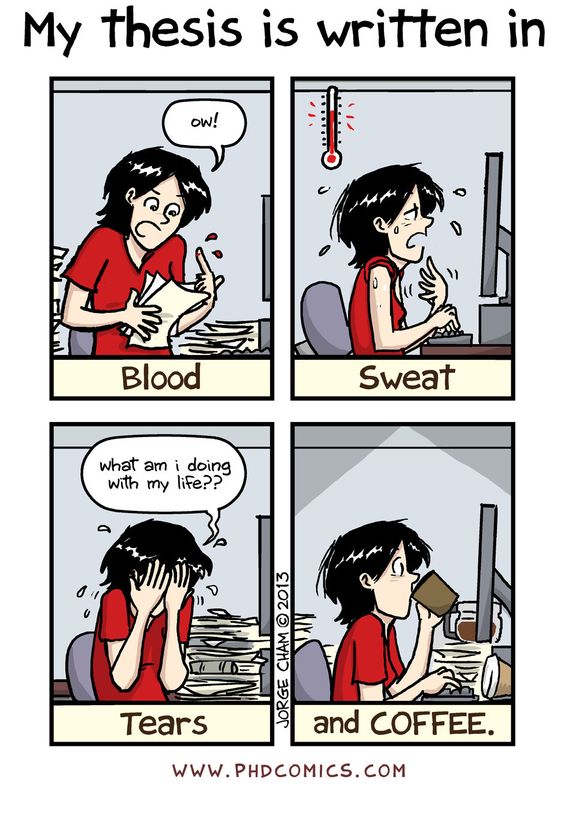
“Piled Higher and Deeper” by Jorge Cham
www.phdcomics.com
This point is worth mentioning first as it applies to all types of writing. Seasoned writers all know that a huge part of writing is rewriting, and that arguably holds true for nonfiction more than any other genre. One of the most important lessons I learned through my years in college and grad school is that scientists can’t hope to turn out quality papers and articles without rigorous research and engaging discussions of their results, but the challenge of writing about science is that science is constantly changing. New research is being published every day and new ideas are emerging every hour, making it nearly impossible to keep drafts of a paper or thesis updated to the minute.
But an endless stream of new research isn’t the only challenge of academic writing. Perfectionism has long been a barrier to productivity, as any writer with a strong inner critic can attest. You can strive to cite every relevant reference, cover every possible discussion point, and smooth out every error to the tiniest misplaced comma, but at some point you just have to accept that your paper/article/thesis will never be flawless by the time you submit it for publication. Don’t sweat it; that’s what editors are paid for!
Writing my thesis definitely pushed my limits in academic literacy and technical perfectionism. Tackling both these obstacles every day, it’s a wonder I ever even finished the first draft!
2) Scientific writing is not the same as literary writing.
Most of my writing takes the form of stories and poetry, which presented a challenge for me when it came to writing the main chapter of my thesis. Despite constant reminders to myself of the differences between scientific and literary composition, more than once I found myself falling into old creative writing habits, including, but not limited to:
- omitting important explanations in the introduction,
- using layman’s terms in place of scientific terms,
- lampshading flaws and shortcomings in the study (yes, really), and
- building suspense to the “grand reveal” of my results (which I still think was justified given that I discovered we were dealing with a different species than we initially thought).
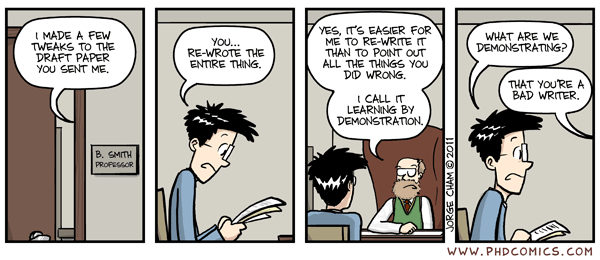
“Piled Higher and Deeper” by Jorge Cham
www.phdcomics.com
Honestly, my artistic side wants to turn everything I learned throughout my Master’s program into a novel, but my scientific side insists on being reasonable (i.e. following my professor and colleagues’ directions) and sticking to hard facts and logical discussions without embellishing the text with my storytelling voice. If this whole endeavor wasn’t challenging enough to begin with, these dueling voices in my head made the final stretch one heck of a ride!
3) Between the time you start your thesis and the time you defend it, your project will change at least a dozen times.
And if you’re lucky, that’s the most it will change. I was accepted into my Master’s program with a proposal for a phylogeographic study of four reef fish species spanning the Atlantic Ocean. By the time I defended my thesis, the project had been narrowed down to one species in Brazil, which later turned into a study of the entire genus across the Atlantic and part of the Pacific, and had been expanded from a purely genetic analysis to include an ecological component about the fish’s feeding activity. Now try reading back this paragraph a few times fast and you may get a sense of the headaches I went through over the last few years.
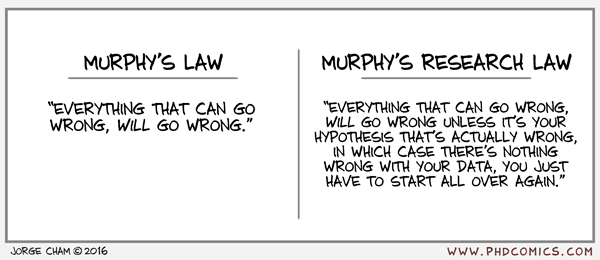
“Piled Higher and Deeper” by Jorge Cham
www.phdcomics.com
Still, exploring different projects is part of the grad school experience (or so I hear), and it was certainly an educational endeavor. Though more than a little frustrating at times, it did offer an insight into the life of a scientist: methods will fail, new ideas will emerge, projects will change, and in the end, you’ll find yourself arduously studying a subject you’d never even considered when you started. New grad students, be warned: until you finally defend your thesis/dissertation, you’re in for an academic rollercoaster ride!
4) Coauthoring is both easier and harder than writing alone.
Speaking as a writer who prefers to work solo, I’ve found there are advantages and disadvantages to collaborating with other authors on an article. On the one hand, different perspectives mean different ideas and contributions, which more often than not result in a well-rounded study and, consequently, a high-quality paper. On the other hand, opinions between authors can (and will) conflict during the writing process, which will make turning out the final draft all the more challenging.
As the lead author of a paper with five names to its title (and counting), I’m in charge of writing the text and integrating the other authors’ notes and revisions into each draft. The main advantage of this is that each researcher has their own area of expertise, so I’ve gotten plenty of help as much for the genetic part of the study as for the ecological part. However, some points in the discussion tend to have opposite approaches, and sure enough, I’ve rewritten some paragraphs a few times over after disagreements arose between my coauthors about how best to discuss the results.
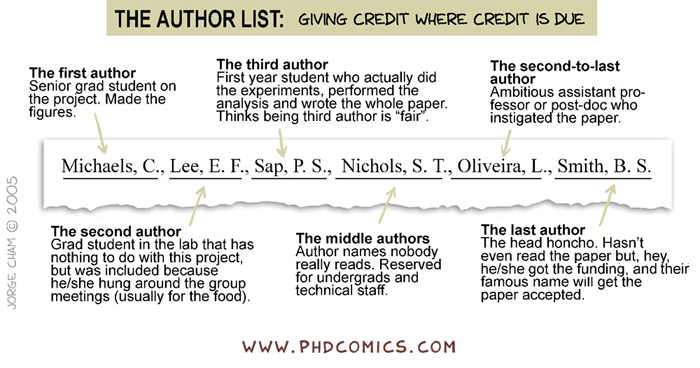
“Piled Higher and Deeper” by Jorge Cham
www.phdcomics.com
Finding a balance hasn’t always been easy, but since all my solo writing experience has been related to fiction, I’m glad to have so much extra input on this project. All that matters is that the final paper is worthy of publication!
5) Successfully completing and defending a thesis brings an incredible sense of accomplishment.
At the risk of sounding cheesy, words cannot describe the elation I felt while standing before the audience at my defense and thanking them for watching the presentation I had just concluded. In that moment, all my hard work, perseverance, and bouts of stress, anxiety, and tears had finally been validated. I was so proud of myself for having made it to that point that I smiled through the whole evaluation and Q&A segment that followed. It was one of the greatest successes of my life, and though it isn’t a bestselling novel, the thesis I toiled over for a year and a half will always hold a special place among my most treasured pieces of writing.
The only question now is whether this sense of achievement is enough motivation to take on double the hard work in pursuit of a doctorate…
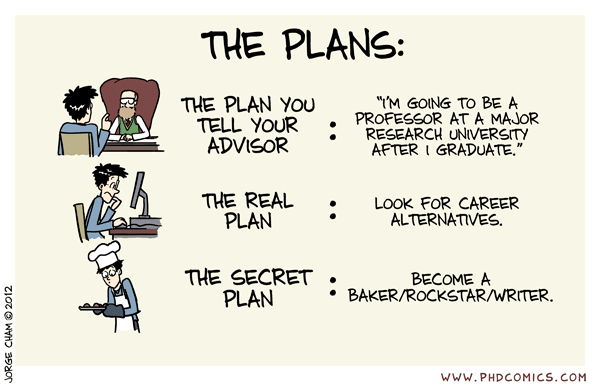
“Piled Higher and Deeper” by Jorge Cham
www.phdcomics.com
What about you? Do you have any college or grad school experiences to share? How have they influenced your writing?
All images in this post are from the comic series “Piled Higher and Deeper” (a.k.a. PHD Comics) by Jorge Cham; I own nothing! For a hilarious insight into life (or lack thereof) in academia, I highly recommend you check out his work!
 1) All of a sudden: an alternative expression for “suddenly”. Write “all of a sudden”, not “all of the sudden”.
1) All of a sudden: an alternative expression for “suddenly”. Write “all of a sudden”, not “all of the sudden”.

 There’s nothing like exaggeration to get a point across. Who among us hasn’t shared our experiences of “the greatest thing ever”, “the worst day in history”, or “the most fun I’ve ever had in my entire life”? Hyperbole is a common device for creating emphasis, as exaggeration tends to have a great impact on an audience’s perceptions of a given description.
There’s nothing like exaggeration to get a point across. Who among us hasn’t shared our experiences of “the greatest thing ever”, “the worst day in history”, or “the most fun I’ve ever had in my entire life”? Hyperbole is a common device for creating emphasis, as exaggeration tends to have a great impact on an audience’s perceptions of a given description.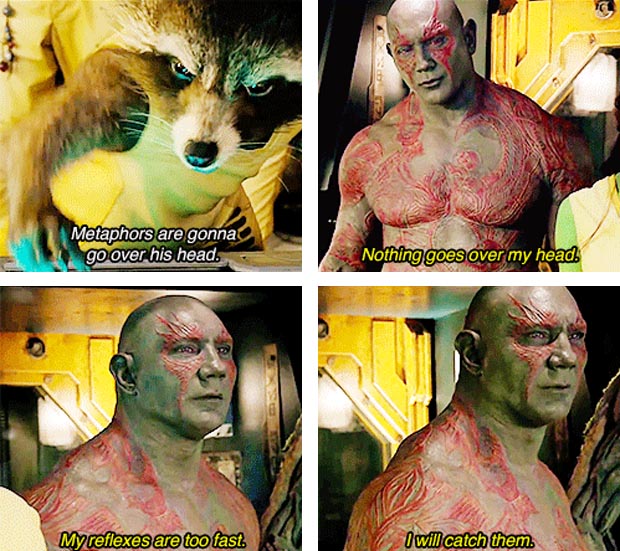

 This one was
This one was 

 What if… your nightmares were actually prophecies?
What if… your nightmares were actually prophecies?






Recent Comments